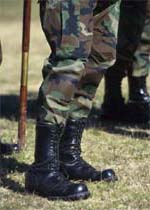
|
Discharging Lesbian, Gay & Bi Linguists Two Dozen Linguists are Targeted Under 'Don't Ask, Don't Tell' Expulsions Persist Despite Critical Scarcity of Trained Personnel Servicemembers Legal Defense Network
Yesterday, the ^Washington Post ~reported that SLDN has now assisted twenty-four linguists targeted under "Don't Ask, Don't Tell." Nine of those assisted have been trained in Arabic. Eight were Korean language specialists, and three were trained to speak Farsi. SLDN has also provided assistance to two Chinese and two Russian linguists. "Our nation faces a serious shortfall in the number of trained professionals who can speak and decipher the languages critical to our national security," said SLDN Executive Director C. Dixon Osburn. "The continued firing of lesbian, gay and bisexual Americans who are trained in those languages underscores the detriment of 'Don't Ask, Don't Tell' on our nation." According to a Government Accounting Office (GAO) study released in January 2002, the Army faces a critical shortfall in linguists needed to translate intercepts and interrogate suspected terrorists. The report concluded that staff shortfalls "have adversely affected agency operations and compromised U.S. military, law enforcement, intelligence, counterterrorism and diplomatic efforts." The majority of language specialists are being discharged from the Defense Language Institute (DLI), the military's premiere language training facility in Monterey, California. SLDN also reported in 1999 a series of significant "Don't Ask, Don't Tell" violations at DLI, including a witch-hunt which resulted in the discharge of 14 service members. In a February 12, 2003 letter to Army Inspector General Paul Mikoleshek, SLDN offered to visit DLI and provide assistance to the Army in reducing the base's gay discharges. To date, LTG Mikoleshek has not responded to SLDN's offer. Cathleen Glover, a recently discharged Arabic linguist, wrote in the Monterey Herald newspaper that, "The fear that we all feel in these hostile environments is a constant presence. It drives some of us into severe depressions and others of us to seek discharge in order to protect ourselves. This is the only way we can ensure our safety, since the upper ranks of the military refuse to do so." Senator Russ Feingold (D-WI) recently remarked on the Senate floor that "Not only does the "Don't Ask, Don't Tell" policy waste time, money and linguistic skill, it also initiates discrimination against those who simply want to serve their country." Representative Barney Frank (D-MA) called the discharges "a new height of stupidity." |
 Washington, D.C. - In an alarming trend, the United States military continues to discharge lesbian, gay and bisexual linguists, despite a critical need for language specialists. As originally reported by Nathaniel Frank in the November 18, 2002 issue of ^New Republic,~ Servicemembers Legal Defense Network (SLDN) provided legal assistance to nine linguists, trained in Arabic and Korean, during the fall of last year.
Washington, D.C. - In an alarming trend, the United States military continues to discharge lesbian, gay and bisexual linguists, despite a critical need for language specialists. As originally reported by Nathaniel Frank in the November 18, 2002 issue of ^New Republic,~ Servicemembers Legal Defense Network (SLDN) provided legal assistance to nine linguists, trained in Arabic and Korean, during the fall of last year.